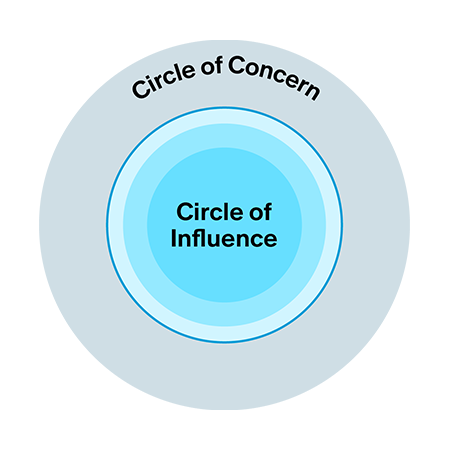Helping Students Choose
Habit 1: Be Proactive is about helping students take responsibility for their lives. Every other habit depends on this first one—the ability to act proactively rather than reactively and to make things happen rather than waiting for them to happen.
Imagine a classroom, a program, or an institution of students who took complete accountability for their lives. Students who understand this first habit focus their efforts on the things they can influence. They choose to prepare for their future and seize opportunities. They avoid procrastinating, worrying, or waiting for things to change.
One of the most important indicators of whether a student is responding proactively or reactively is the language they use. Proactive language sounds like “I can” or “I get to.” Reactive language sounds like “I can’t” or “I have to.”
Helping students learn to use consistent, proactive language affirms their capacity to choose and reinforces a proactive approach to life.
Circle of Influence®
The Circle of Concern represents everything a student might worry about, but can’t influence. Think deadlines, global events, campus policies, etc.
The Circle of Influence includes things within a student’s Circle of Concern that they have the power to change. The more time they spend here, the more they’ll increase their influence. They’ll find new opportunities and make choices based on how they want their lives to look.
As students thoughtfully write out things within their circle of influence and act on them, they become better learners, more resilient, and more likely to graduate.


As you study the other six habits you will see that each depends on the development of your proactive muscles. Each puts the responsibility on you to act. If you wait to be acted upon, you will be acted upon.
Free Tool
Help students find direction and purpose with this free online tool.
Free Guide
See how institutions are improving retention and student success by teaching students the 7 Habits.
Focus and act on what you can control and influence instead of what you can’t.
Define clear measures of success and a plan to achieve them.
Prioritize and achieve your most important goals instead of constantly reacting to urgencies.
Collaborate more effectively by building high-trust relationships.
Influence others by developing a deep understanding of their needs and perspectives.
Develop innovative solutions that leverage different perspectives and satisfy all key stakeholders.
Increase motivation, energy, and work/life balance by making time for renewing activities.
See how the 7 Habits can easily integrate into your programs and change the lives of your students.









